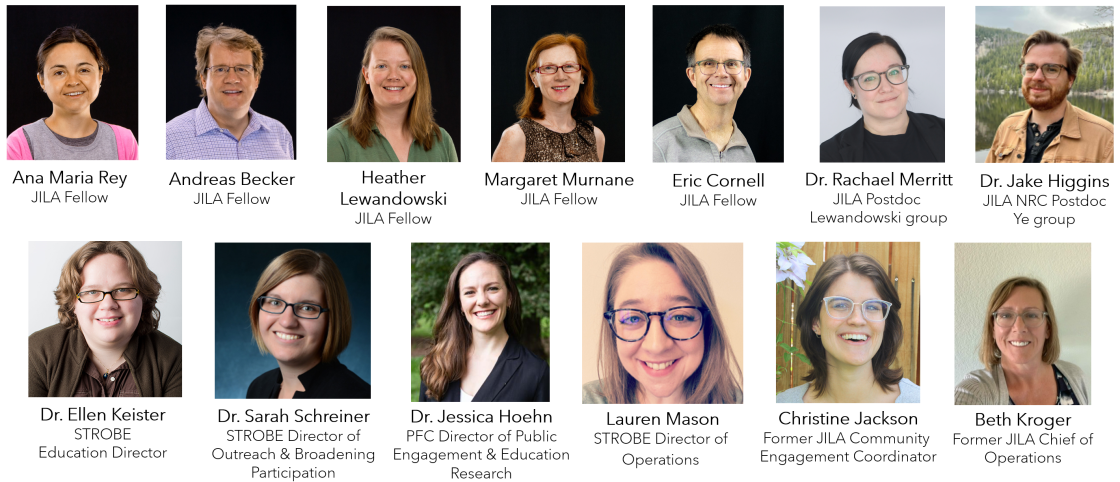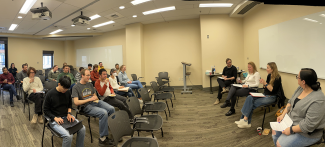Professional development opportunities facilitate JILA’s mission to equip postdoctoral researchers and senior graduate students to become the scientific leaders of the future. Scientific research careers require technical research experience, as well as skills in collaboration, leadership, creative visioning, and communication. Engaging professional development opportunities in project management, proposal development, and mentoring develop scientific leaders and complement JILA's world-class research. Postdoctoral researchers and senior graduate students may register for each training individually, or complete all of the trainings and receive a certificate.
What is the JILA Research Professional Development Certificate?
The JILA Research Professional Development Certificate offers opportunities to develop necessary skills for scientific leadership. The certificate includes four required professional trainings, which is a minimum 16-hour time commitment over 1-2 years. JILA encourages participation in the full certificate to be a well-rounded leader. The curriculum is designed to formalize and augment workforce preparation for careers in academia, industry, and national laboratories and expand professional skills development beyond the exceptional technical research training currently offered at JILA. These trainings cultivate skills such as effective communication, navigating conflict, fostering independence, creating a strong research project plan, collaboration, and leadership.
| Training Module | Next Date (Dates will be selected following registration) |
Instructors | Training Length |
| Project Management for Research | October 2025 | Dr. Ellen Keister | 4 hours |
| Science Communication (Elective) | November 2025 | Dr. Sarah Schreiner and Kenna Hughes-Castleberry | ~3-4 hours |
| Mentoring in a Research Environment | Spring 2026 | Dr. Ellen Keister, Dr. Sarah Schreiner, Lauren Mason | 5 hours |
| Proposal Development | Spring 2026 |
Jim Mazzouccolo, RIO Joyce Kroll, JILA |
4 hours |
Training Descriptions and Certificate Requirements
The certificate has three core and one elective requirement.
- 1) Project Management for Research
-
Description: This workshop introduces formal project management, including standard terminology, practices, and the rationale for utilizing project management techniques. Adaptations necessary to apply these techniques in academic and other research contexts will be discussed, and opportunities provided to work through relevant examples. Designed to be relevant for all career sectors, this workshop will also provide practice and resources that can be utilized in participants’ current positions.
Learning Objectives:
- Understand standard project management terminology
- Identify and translate standard elements to academic research contexts
- Articulate reasons to use formal project management in academic research settings
- Implement best practices for team building and operation
- Develop standard plans, including communication, work breakdown, estimating and scheduling
Training Length: 4 hours
Instructor and Training Development: Dr. Ellen Keister
- 2) Proposal Development
-
Description: This training provides an overview of typical components of proposal solicitations, such as narrative, budget, mentoring plan, supplementary documents, etc. Review example solicitations such as NSF CAREER and other early career proposal opportunities, foundations, fellowships, etc.
Learning Objectives:
- Gain a fundamental understanding of proposal requirements and structure
- Learn about different kinds of proposal solicitations and where to find them
Training Length: 4 hours
Instructor: Jim Mazzouccolo and Joyce Kroll
- 3) Mentoring in a Research Environment
-
Description: This training was developed by the Center for the Improvement of Mentored Experiences in Reseearch (CIMER) at University of Wisconsin Madison and provides evidence-based, interactive mentor training curricula that engages mentors in collective problem solving and connects them with resources to optimize their mentoring practices. Mentors engage in activities, assignments, case studies, and facilitated discussions to solve mentoring dilemmas and share successful mentorship strategies.
Learning Objectives:
- Gain leadership competencies in aligning expectations, effective communication, communication, assessing mentee understanding, and fostering independence.
- Create a strong research mentorship plan that can be used with undergraduate and graduate student mentees and in research proposals.
Training Length: 5 hours
Instructors: Dr. Ellen Keister & Dr. Sarah Schreiner
- 4) Elective Options
-
Description: Postdocs are invited to select one elective training that supports their chosen career track to hone specific leadership skills and competencies. Electives cover topics such as teaching, emotional intelligence, communication, etc. Select at least one option:
- Social & Emotional Intelligence in STEM Environments
- Crucial Conversations
- Science Communication
- Teaching and Learning Physics course
- Other trainings can qualify as an elective following review. Please email us for review and approval.
Learning Objectives, training length, and instructor: Varies
The Team
The JILA Research Professional Development Certificate was created in collaboration with JILA Postdoctoral Researchers, Fellows, and staff and is informed by current best practices. Thank you to the JILA team and the National Science Foundation through the JILA Physics Frontier Center and the STROBE Science & Technology Center for contributions and support.

FAQs
- Does JILA track my progress on completing the certificate?
-
Yes! JILA takes attendance at all trainings and tracks certificate completion.
- What if I want to take some of the trainings but not complete the whole certificate?
-
You are welcome to register for any of the certificate professional trainings and you are not required to complete the certificate. However, we encourage you to consider taking all of the trainings as they will support your professional development towards your chosen career path.
- How are the training times scheduled?
-
Complete the registration using the links in the table above. We will email all registrants a poll to determine the best time for all participants to take the training.
- What is CIMER?
-
CIMER is an NSF-funded center called the Center for the Improvement of Mentored Experiences in Research (CIMER). CIMER’s “mission is to improve mentoring relationships for research trainees and mentors at all career stages through the development, implementation and study of evidence-based and culturally-responsive interventions and the study of mentoring ecosystem.” You can learn more about CIMER here.
- What if I’m interested in more than one of the elective trainings?
-
While only one elective is required to complete the certificate, you are welcome to sign up for and participate in more than one elective.
- Can I participate in the trainings if I am postdoc but not at JILA?
-
Please contact Lauren Mason to see if there is space available.
- Should I participate in the trainings as a first/second-year graduate student?
-
Many of the modules are designed for participation of graduate students in the second half of their studies. We encourage you to speak to your research advisor and your graduate student mentor about it and to contact Lauren to discuss further.
Contact Us
We want to hear from you! If you have ideas, suggestions, or feedback, please contact us. Please note that anonymous feedback surveys are distributed following each training so we can continue to improve and hone the certificate offerings.
Andreas Becker – Andreas.Becker@colorado.edu
Lauren Mason – Lauren.Mason@colorado.edu
Acknowledgement: The development of the training opportunities and the certificate is supported by the National Science Foundation through the JILA Physics Frontier Center in collaboration with the STROBE Science & Technology Center.




